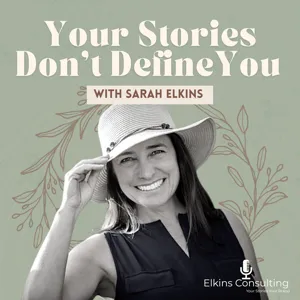Podcast Summary
Exploring the Good, Bad, and Ugly of Self-Help and Personal Growth: Self-help and personal growth can offer valuable tools for happiness and well-being, but beware of toxic positivity and forced happiness.
Self-help and personal growth can offer valuable tools for achieving happiness and well-being, but it's important to be aware of potential pitfalls. Self-help has been a significant part of Forrest Hanson's life for over 50 years, and he's seen the good, the bad, and the ugly. He came of age during the counterculture movement and was drawn to the possibilities of human potential. But he also encountered negative aspects, such as toxic positivity and forced happiness. Dr. Rick Hansen, Forrest's father and co-host, shares similar experiences. They plan to explore these topics in upcoming episodes, emphasizing the importance of finding a balanced approach. Remember to support the podcast through Patreon and subscribe, rate, and review to help spread the word.
Open dialogue and accountability crucial in preventing issues: Constructive criticism towards leaders, transparency, and walking the talk are essential for preventing issues in institutions and self-help programs. Approach online resources with a critical eye.
Open dialogue and accountability are crucial in preventing issues in institutions or self-help programs. The absence of constructive criticism towards leaders can lead to trouble, including phoniness, abuse, and an unscientific rejection of personal growth. It's essential to have a transparent environment where leaders are open to feedback and make visible corrections. Additionally, standing in lineage and ensuring leaders walk their talk are other protective factors. However, the rise of self-help online, particularly on social media platforms like Instagram and YouTube, has brought new challenges. The younger generation may have less experience with in-person workshops and settings, making them more susceptible to the dark side of self-help, such as false advertising and unrealistic expectations. It's important to approach online resources with a critical eye and seek out authentic and evidence-based information.
Democratization of mental health resources: Pros and cons: Be cautious and discerning when consuming self-help content, prioritize validated research and evidence-based practices, and approach mental health and personal growth with a critical and informed mindset.
The democratization of content access has led to an increase in free mental health resources, but the validity of these experts and the credibility of their information can be uncertain. While it's important to acknowledge that not everyone needs a master's degree to share valuable insights, the ease of faking credentialing and the prevalence of toxic positivity on social media platforms pose challenges. It's crucial to seek wholesome goals with wholesome means and recognize that certain skills don't require extensive expertise. However, it's essential to be cautious and discerning when consuming self-help content and to prioritize validated research and evidence-based practices. Ultimately, the responsibility lies with the individual to evaluate the credibility of the sources they engage with and to approach mental health and personal growth with a critical and informed mindset.
Mindful coping and intentions matter in mental health support: Be authentic in mental health support, ensure intentions are pure, consider expertise level, and avoid toxic positivity.
While it's important to find ways to help ourselves cope with losses and sorrows, we must be mindful of our true intentions. We should ensure that our motivations for teaching methods or tools are pure, and that we're offering real value. Additionally, when seeking mental health resources, it's crucial to consider the expertise level of the person providing the content. The concept of forced happiness or toxic positivity, where we avoid negative emotions and make others feel more comfortable, can be harmful. It's essential to recognize that we all have a "scared self" and a "being" within us, and authenticity in our expressions is vital. While presenting an act or a selective version of ourselves is acceptable in some situations, it's essential to ensure that what we do say is true for us.
The harm of toxic positivity and disconnecting from true selves: Toxic positivity can hinder personal growth and relationships by creating a false persona, leading to discomfort and homeostasis. Embracing negative emotions and allowing authentic expression can lead to greater growth and meaningful connections.
Toxic positivity, or the pressure to constantly put on a happy face and hide negative emotions, can be harmful to personal growth and relationships. By disconnecting from our true selves, we create a false persona that can be damaging to ourselves and others. The process of personal growth involves gradually disidentifying from this act and allowing our deeper feelings to be more integrated and included. This leads to more authentic and meaningful connections with others. This concept can be related to Jungian psychology and the idea of the shadow self. In our modern society, we often see this false persona in social media and corporate culture, where people are encouraged to hide their negative emotions and present only the positive. This can lead to a lack of genuine connection and emotional expression. It's important to create environments where people feel safe and comfortable expressing their full range of emotions, rather than trying to force happiness upon them. Toxic positivity can perpetuate a culture of discomfort and homeostasis, and it's important to understand the motivating factors behind this cultural phenomenon. Embracing our negative emotions and allowing ourselves to feel and process them can lead to greater personal growth and more authentic connections with others.
Authenticity in Personal and Professional Life: Authenticity is essential for building strong relationships and making informed decisions. Listen to the Doctor John DeLaney Show and ZOE Science and Nutrition Podcast for practical advice and scientific insights.
Authenticity matters in all aspects of life, whether it's in personal relationships or in business transactions. The doctor John DeLaney Show and the ZOE Science and Nutrition Podcast provide valuable resources for improving physical and emotional health, respectively. In the former, real people call in for practical advice on navigating life's challenges. In the latter, world-leading scientists help listeners make informed health choices. Authenticity was also emphasized as a crucial element in personal interactions, with swerving from the real sending a chilling message that it's not okay to be genuine. By being authentic and encouraging authenticity in others, we can create a supportive environment for growth and expansion. Use discount code "beingwell" for 15% off at oneskin.co, and check out the doctor John DeLaney Show and ZOE Science and Nutrition Podcast for more insights and information.
Authentic emotions matter: Authentic emotions are crucial for personal growth and well-being. Forcing positivity can invalidate negative emotions and hinder personal growth.
Authenticity is crucial when it comes to positive emotions and experiences. While positivity and happiness have numerous benefits, promoting the idea that positivity cures all can be problematic. It can lead to invalidating people's authentic negative emotions and forcing them into a non-authentic way of being. This can hinder personal growth and the realization of a more whole self. The pressure to put up a front or sell oneself as a certain kind of person can also contribute to this issue. Therefore, it's essential to focus on authentic experiences, allowing ourselves and others to feel and express a full range of emotions, and recognizing that positivity is just one aspect of personal growth and well-being.
Be authentic and vulnerable to create deeper connections: Authenticity and vulnerability are key to creating deeper relationships. Notice how others respond and reflect to improve connection.
Creating an authentic and vulnerable space for others to share their feelings requires us to be authentic and vulnerable ourselves. This means speaking from a place of integration and feeling what we're expressing, rather than reporting on our experiences in a detached way. The quality of our interactions, even those that are less than a minute long, shape relationships over time. When we make a bid for deeper intimacy or connection, it's important to notice how others respond. Those who do not go into rapport with our bid for deeper connection can hinder the development of a relationship. By paying attention to these interactions and reflecting on them, we can improve our ability to build meaningful and authentic relationships.
Be attentive to subtle cues and respond appropriately for deeper connection: Acknowledge and work through negative emotions for greater overall well-being, find balance in sharing and holding back, and recognize societal influences while staying true to yourself
Effective communication and connection with others involves being attentive to their subtle cues and responding appropriately. This creates a safe space for deeper sharing and processing emotions, rather than hiding or denying them. It's important to acknowledge and work through negative feelings, rather than avoiding them, as this leads to greater overall well-being. Personal experiences and societal norms can influence how we express ourselves and connect with others, but finding a balance between sharing and holding back is key. The Buddha's teachings emphasize starting with acknowledging suffering, but not stopping there, as growth and liberation come from working through challenges.
Consider a guru's ethics when evaluating them: Evaluate a guru's ethics for authentic growth. Beware of deceptive language, refund difficulties, and commoditizing attitudes. Trust your feelings and seek authentic relationships for personal growth.
When evaluating gurus or teachers in the self-help and personal growth realm, it's crucial to consider their ethics. Individuals who are ethical in small matters are more likely to be trustworthy in larger ones. Be wary of deceptive language, difficulty in obtaining refunds, and a commoditizing attitude towards students. Ultimately, how you feel around a person is the most fundamental measure. If you leave feeling better about yourself, enlarged, and seen, then the relationship is likely worth pursuing. Conversely, if you feel deflated or as if you've experienced a sugar high, it may be time to reconsider. Remember, authentic growth comes from authentic relationships. So, reflect on environments that may push for forced positivity and decide how to engage with them while staying true to yourself. This balance of exterior and interior experiences is essential for personal growth. Don't forget to check out our Patreon account at patreon.com/beingwellpodcast for support and upcoming episodes on this topic.










